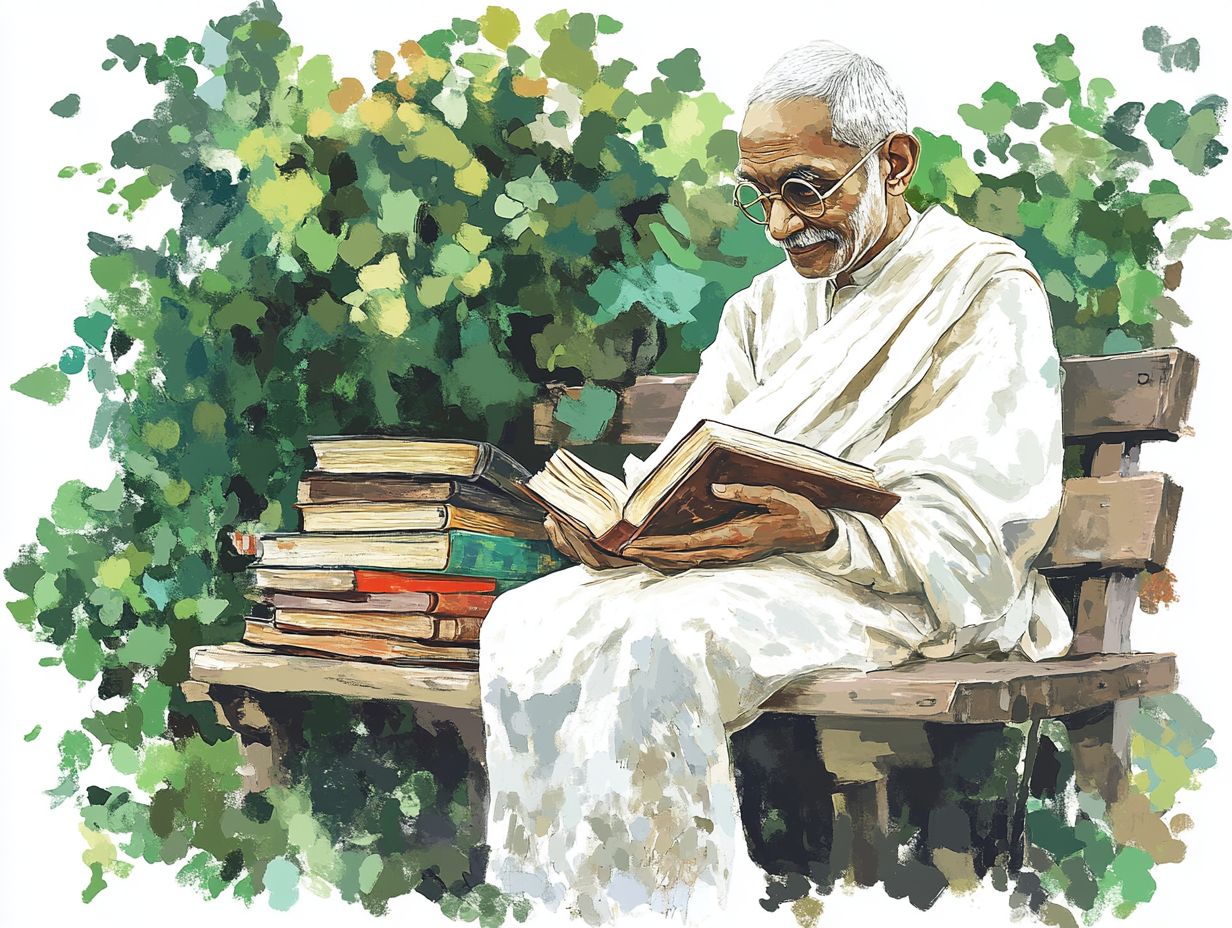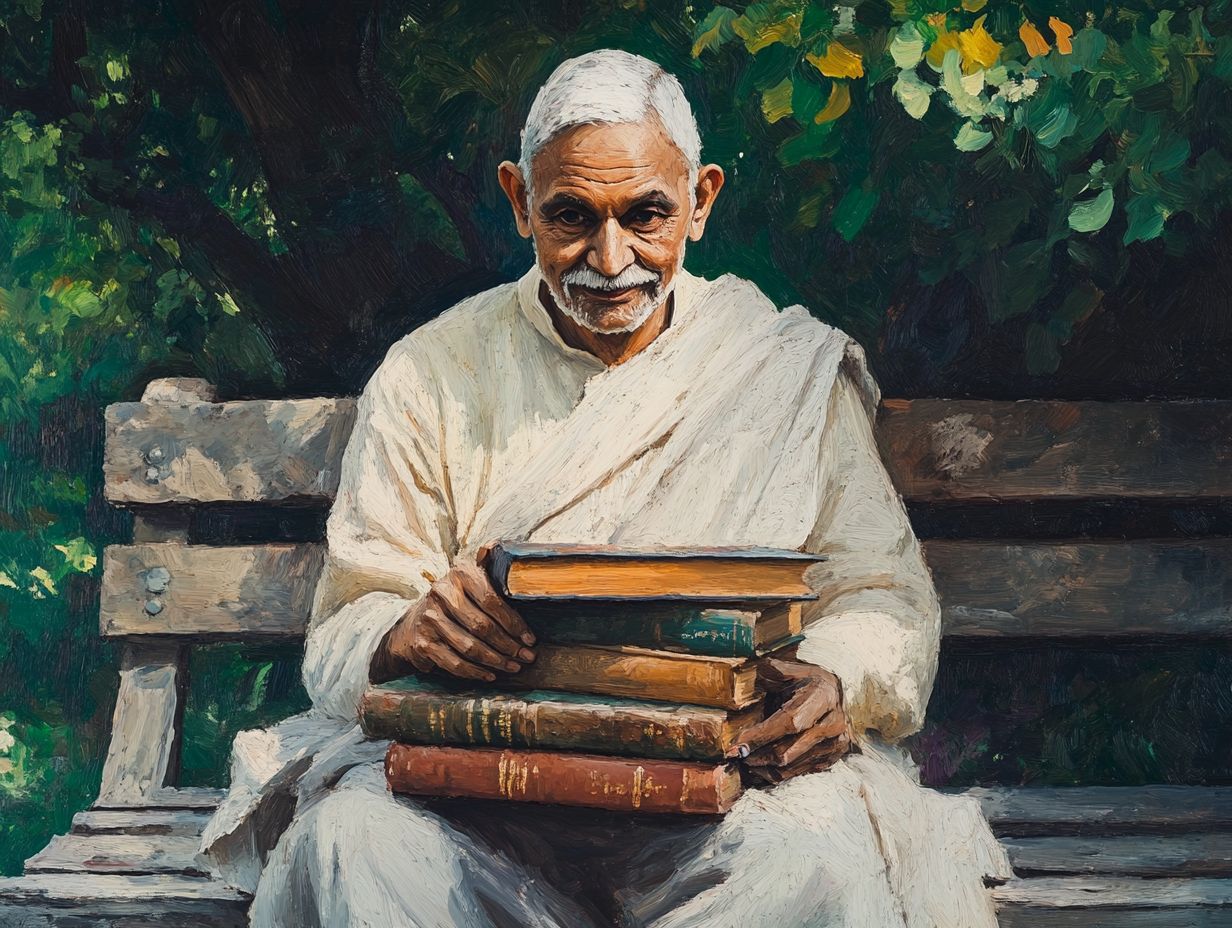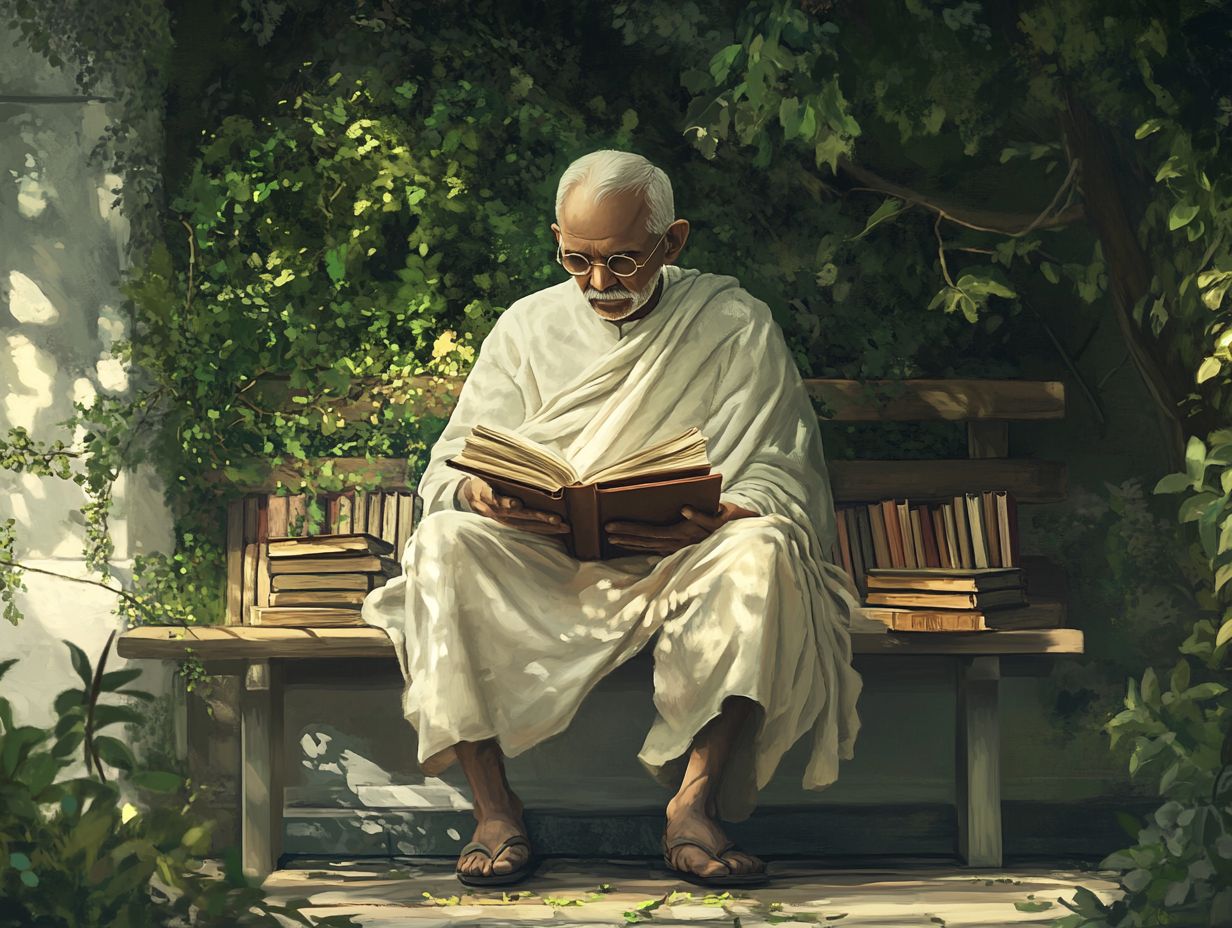5 Life Lessons from Mahatma Gandhi
Mahatma Gandhi’s life and philosophy provide profound insights that resonate with you even today. His unwavering commitment to non-violent resistance, compassion, and simplicity serves as a guiding light for both personal and societal transformation.
You can explore five essential life lessons from Gandhi, including the power of forgiveness, the significance of selfless service, and the importance of standing firm in your beliefs.
Reflect on his inspiring quotes, the challenges he faced, and the lasting impact of his teachings on conflict resolution. Discover how Gandhi’s principles can shape not only your life but also the world around you.
Contents
- Key Takeaways:
- 1. Non-Violent Resistance Can Bring about Change
- 2. The Power of Forgiveness and Compassion
- 3. Simplicity and Minimalism Can Lead to Inner Peace
- 4. Selfless Service and Putting Others First
- 5. The Importance of Standing Up for What You Believe In
- How Did Mahatma Gandhi’s Principles Influence the World?
- Frequently Asked Questions
- Curious about the wisdom of Mahatma Gandhi? Here are the key life lessons that can inspire us all!
- What were the five main life lessons taught by Mahatma Gandhi?
- How did Mahatma Gandhi exemplify non-violent resistance?
- Why is forgiveness considered a key lesson from Mahatma Gandhi?
- How did Mahatma Gandhi practice self-discipline in his life?
- What was the significance of simplicity in Mahatma Gandhi’s teachings?
- How did Mahatma Gandhi’s perseverance impact his life and the world?
Key Takeaways:

- Non-violent resistance can bring about positive change in society.
- Forgiveness and compassion have the power to heal and create positive relationships.
- Simplicity and minimalism can lead to inner peace and contentment.
1. Non-Violent Resistance Can Bring about Change
Non-violent resistance, as championed by Mahatma Gandhi, presents a powerful approach that can ignite significant social change. It not only fuels civil rights movements around the globe but also enhances mental health through effective stress management and the cultivation of inner peace.
A positive attitude can truly transform society into a more harmonious place! This philosophy has inspired many people in India to pursue independence from colonial rule, serving as a guiding light for international figures like Nelson Mandela and Martin Luther King Jr., who adopted similar tactics in their battles against injustice.
By employing strategies such as peaceful protests and civil disobedience the act of refusing to follow laws or commands that are seen as unjust they demonstrated to the world that non-violent methods can effectively challenge oppressive systems, nurturing empathy and understanding among diverse communities.
These approaches do more than tackle external conflicts; they also foster internal healing by alleviating anxiety and building resilience. Ultimately, they reinforce the notion that compassion and kindness are vital in driving sustainable social change.
2. The Power of Forgiveness and Compassion
The power of forgiveness and compassion is essential for building emotional strength and mental health. By embracing these qualities, you enhance your emotional resilience and foster deeper connections with others, navigating adversity with kindness and understanding.
When you choose to forgive, you significantly lower anxiety and depression, making it easier to tackle life’s challenges. Compassion creates an environment where empathy thrives, enhancing communication and trust in your relationships.
As you adopt these practices, you contribute to a ripple effect that can transform social dynamics within your community, leading to greater harmony and mutual support. The journey toward forgiveness and compassion resonates through families, communities, and society as a whole, helping to create a more understanding world.
3. Simplicity and Minimalism Can Lead to Inner Peace
Embracing simplicity and minimalism can profoundly enhance your mental peace. By prioritizing essential values and incorporating practices like meditation and walking into your routine, you nurture both a healthy body and a serene mind.
Adopting a minimalist lifestyle creates a sanctuary for reflection and mindfulness, allowing you to forge deeper connections with yourself and the world around you. This intentional focus on the present fosters a genuine sense of contentment and opens the door to transformative practices, such as meditation.
Regular meditation promotes emotional well-being and mental clarity, while incorporating walking as a daily ritual offers a delightful way to ground yourself. The rhythmic nature of walking, combined with fresh air and gentle movement, alleviates stress and boosts your physical health, making it easier for you to navigate life with grace and tranquility.
Start embracing these lessons today and witness the positive changes in your life and community!
4. Selfless Service and Putting Others First

Engaging in selfless service and placing the needs of others first can create a remarkable flow of positive energy.
This enhances your mental well-being and fosters a vibrant sense of community through acts of compassion and kindness.
Throughout various cultures, the practice of selfless service may manifest in unique ways. Yet, the core benefits remain strong. Take India, for example, where the principle of ‘seva’ captures the essence of serving others without any expectation of personal gain. Community kitchens provide meals to those in need. In Japan, the tradition of ‘omotenashi’ reflects a similar ethos, emphasizing that serving others is an honor that strengthens social bonds.
These examples reveal that by prioritizing others, you nurture your own growth through empathy and resilience. You also reinforce community ties and cultivate an environment rich in mutual support and well-being. This interconnectedness can lead to a deep sense of fulfillment and purpose in your own life.
5. The Importance of Standing Up for What You Believe In
Standing up for what you believe in demands immense courage and determination. It’s not just about personal integrity; it serves as a beacon, inspiring others to advocate for change and adopt a positive mindset in challenging circumstances.
Those who embody such integrity often become leaders who spark change in society. Consider figures like Nelson Mandela, who, despite enduring years of imprisonment, remained steadfast in his belief in equality and justice for all South Africans. Or think of Malala Yousafzai, who boldly championed the right to education for girls in the face of oppressive regimes.
Their strong commitment to their principles not only ignited their respective movements but also motivated countless others to uphold their own values. These leaders exemplify how integrity can lead to meaningful advocacy.
They illustrate that the journey toward positive change often begins with the courage to speak out and take action.
How Did Mahatma Gandhi’s Principles Influence the World?
Mahatma Gandhi s principles powerfully impact movements today, deeply rooted in non-violence and compassion. They have left a significant mark on movements for civil rights and social justice across the globe.
Consider the American civil rights movement, championed by leaders like Martin Luther King Jr., or the anti-apartheid struggle led by Nelson Mandela. Gandhi’s non-violent tactics and strong commitment to justice illuminate the path for those striving to dismantle oppression.
In the current landscape, as communities worldwide confront systemic inequality, environmental degradation, and political turmoil, the relevance of Gandhi’s teachings is striking. Activists persist in drawing inspiration from his ideals, advocating for peaceful protest and dialogue as essential tools for societal change.
This demonstrates that the essence of his philosophy is not only enduring but also more crucial than ever.
What Were Some of Gandhi’s Most Famous Quotes?
Mahatma Gandhi’s most famous quotes encapsulate a philosophy of peace and non-violence. They offer timeless wisdom that can inspire you on your personal and collective journey toward justice and equality.
These poignant words serve as your guiding light, encouraging you to advocate for meaningful change while steadfastly opposing oppression without resorting to violence. In today s landscape, where movements for social justice, environmental sustainability, and equality are gaining remarkable momentum, Gandhi’s insights hold significant relevance.
His assertion that “You must be the change you wish to see in the world” motivates not only activists but also everyday individuals like you to embody the principles you champion. Likewise, his emphasis on truth and the importance of nonviolent resistance affirms the dignity of all people, reinforcing your enduring quest for justice across diverse global contexts.
How Can We Apply Gandhi’s Teachings in Our Daily Lives?

Incorporating Mahatma Gandhi’s teachings into your daily life means embracing compassion and forgiveness and practicing non-violent communication.
This approach involves standing firm in your beliefs with integrity and determination.
One effective way to weave these principles into your interactions is by actively listening during conversations. This creates an open environment that fosters empathy and understanding.
For example, when a colleague shares their frustration, responding calmly and validating their feelings can demonstrate compassion.
Engaging in volunteer activities within your community reflects a commitment to service, aligning with Gandhi’s emphasis on social responsibility.
Whether you re volunteering at a local shelter or organizing a community clean-up, these actions build a sense of connection and promote collective well-being.
By embodying non-violence and unity in your everyday interactions, you can truly honor the spirit of Gandhi’s teachings!
What Were Some of Gandhi’s Biggest Challenges and How Did He Overcome Them?
Mahatma Gandhi encountered many challenges throughout his life, from imprisonment to public opposition.
He triumphed over these obstacles with remarkable perseverance and an unwavering commitment to non-violence and justice.
His journey was not without difficulties; he faced harsh treatment from colonial authorities and skepticism from those who doubted his methods.
During his time in prison, rather than giving in to despair, he used this time for self-reflection, devising strategic non-violent protests and inspiring fellow activists.
Take the Salt March in 1930, for instance. He transformed a minor issue into a monumental campaign against British rule, showcasing his ability to bring people together.
Through such actions, Gandhi solidified his legacy as an iconic leader in the fight for civil rights, proving that steadfast resolve and peaceful resistance can confront daunting challenges.
What Can We Learn from Gandhi’s Approach to Conflict Resolution?
Gandhi’s approach to conflict resolution, rooted in non-violence and dialogue, provides profound insights into achieving internal peace and fostering understanding in disputes.
It s important to embrace empathy and communication to bridge divides between differing parties.
In today’s polarized environments whether in workplaces or community initiatives facilitating open discussions where individuals can express their views without fear of retribution leads to harmonious outcomes.
Practicing active listening, where you genuinely hear what the other side is expressing, resonates with Gandhi s belief in prioritizing understanding over mere disagreement.
By incorporating these principles into your approach, you can create a more inclusive atmosphere in modern conflict situations, paving the way for meaningful resolutions.
How Did Gandhi’s Legacy Continue After His Death?
Mahatma Gandhi’s legacy is a beacon of inspiration for civil rights movements worldwide.
His principles of non-violence and peaceful resistance remain relevant in today s ongoing struggles for justice and equality.
Consider leaders like Martin Luther King Jr. in the United States and Nelson Mandela in South Africa, who drew upon Gandhi’s teachings in their battles against oppression and discrimination.
King s philosophy of non-violent protest was deeply influenced by Gandhi’s methods, resulting in pivotal moments during the American civil rights movement, such as the Montgomery Bus Boycott and the March on Washington.
Similarly, Mandela’s fight against apartheid echoed Gandhi’s vision of equality, paving the way for a peaceful transition to democracy in South Africa.
These examples illustrate how Gandhi’s ideals continue to energize individuals and movements around the globe, all striving for meaningful societal change!
Frequently Asked Questions

Curious about the wisdom of Mahatma Gandhi? Here are the key life lessons that can inspire us all!
What were the five main life lessons taught by Mahatma Gandhi?
Mahatma Gandhi taught five main life lessons. They are non-violent resistance, forgiveness, self-discipline, simplicity, and perseverance.
How did Mahatma Gandhi exemplify non-violent resistance?
He believed peaceful protests and civil disobedience could drive change. Gandhi famously used these methods in India s fight for independence.
Why is forgiveness considered a key lesson from Mahatma Gandhi?
Gandhi emphasized forgiveness as a strength. He said, “The weak can never forgive. Forgiveness is the attribute of the strong.”
How did Mahatma Gandhi practice self-discipline in his life?
He valued simplicity and self-discipline. Gandhi practiced self-control in his thoughts, actions, and habits.
What was the significance of simplicity in Mahatma Gandhi’s teachings?
Gandhi advocated for a simple life and minimalism. He argued that material wealth does not bring true happiness.
How did Mahatma Gandhi’s perseverance impact his life and the world?
Gandhi faced many challenges in his fight for independence. His determination inspired millions and helped achieve his goals.





